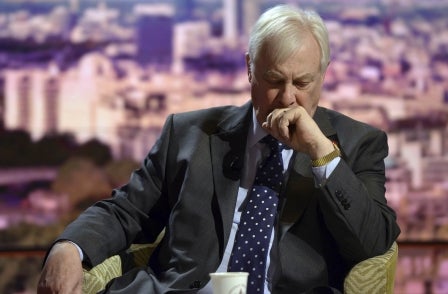
Lord Patten today defended the BBC's £450,000 pay-off to former director general George Entwistle, saying it had been agreed it was "defensible" and "better than any other course of action".
The BBC Trust chairman appeared before the Commons Culture, Media and Sport Committee amid continuing anger over the award of a full year's salary to Entwistle after completing just 54 days in the job.
But he told MPs the corporation had paid Entwistle less than he originally wanted, and by doing a deal with him had avoided potentially paying out more in constructive dismissal and possibly unfair dismissal claims.
Entwistle was finally forced to quit after BBC2's Newsnight wrongly implicated Lord McAlpine in a child abuse scandal – leading to a £185,000 pay-out to the peer.
The then director general had been under fire for weeks over an apparently slow and unconvincing response to the Jimmy Savile abuse scandal and his decision to continue with tribute programmes to the late DJ last Christmas even though he had known Savile was the subject of an earlier Newsnight investigation.
There was incredulity among MPs when it emerged last week that Mr Entwistle insisted on a full 12 months salary before quitting – even though he was contractually entitled to just half that amount.
In addition, he received £35,000 for legal expenses and £10,000 for public relations as well as 12 months private medical cover.
Today Lord Patten, who appeared before MPs alongside acting director general Tim Davie, justified the decision.
He described how he had told Entwistle: "We are not urging you to go but we are not urging you to stay."
Entwistle had wanted to leave through a "consensual termination of his contract", but had insisted on leaving the corporation "on 12 months or more", Lord Patten said.
But he said after discussions with lawyers it became clear to him that without doing a deal, the case could develop into one of constructive dismissal or unfair dismissal, ultimately costing even more.
He said: "£450,000 is one hell of a lot of money.
"The idea that I did not understand how politically difficult it would be suggests a degree of political innocence on my part which I have to tell you does not exist.
"But the options I had were absolutely clear.
"We either had to deal with it quickly there and then, broadly speaking on the terms of 12 months, though that was less than we were asking for, or we had to go to constructive dismissal and constructive dismissal would have landed us with exactly the same amount of money, plus almost certainly another £80,000 of unfair dismissal."

Lord Patten said that at every stage he was taking advice from lawyers Baker & McKenzie.
"I discussed it with Baker & McKenzie among other things on this basis – when I have to defend this in front of the PAC (Public Accounts Committee) is it defensible?
"Their agreement was not only is it defensible but it is better than any other course of action, unless we wanted the BBC to drift on without somebody at the top."
He said the deal included private health care, Entwistle's legal costs for "contracting out of his employment rights", as well as his legal fees for appearing in front of inquiries.
Lord Patten said the corporation also agreed to provide assistance for dealing with the media for a three-month period, but had not yet been asked for any help.
"What did we get in return?," he said. "First of all we got a settlement that was less than we would have got had we gone through constructive dismissal.
"Secondly, we got a warranty from Entwistle that if Pollard or anything else finds that has has done anything which is in breach of his contract or the BBC disciplinary guidelines, we can claw back some of the remunerations that has been paid."
Asked whether money had been kept back, Lord Patten said it would not be paid until December.
He added: "When we were doing that deal on Saturday night in difficult circumstances I was not unaware of the fact that I would have to explain it very carefully to committees like this in the future because licence feepayers would inevitably be very concerned about it."
'He does not deserve the damage to his reputation'
Lord Patten said Entwistle had taken a "large cut" in salary compared to his predecessor.
But he said: "I do wish… that his lawyers had counselled him strongly to accept £225,000, of course I do, because I think he does not deserve the damage to his reputation."
He said he would like the National Audit Office to look at the severance terms that the BBC is obliged to pay staff.
Lord Patten said: "The easiest thing to do is to join in the general thrashing of a decent man and I'm not going to do that."
Entwistle is "a decent man and doesn't deserve to be bullied or have his character demolished", he added.
Committee chairman John Whittingdale said Mr Entwistle's own performance in front of the committee had been "depressing".
Lord Patten said it had cost £186,000 in recruitment costs to fill the seat eventually taken by Mr Entwistle.
"Pretty much everyone said at the time it was a very good choice," he said.
"I think he was completely overwhelmed by Savile and all that came after it."
He said he thought Mr Entwistle "found it incredibly difficult to cope with a crisis in which he had been initially involved."
He found it "much more difficult than you or I", he told MPs, "to cope with photographers and cameras at his door".
"We have maybe got thicker skins," he added.
Email pged@pressgazette.co.uk to point out mistakes, provide story tips or send in a letter for publication on our "Letters Page" blog
